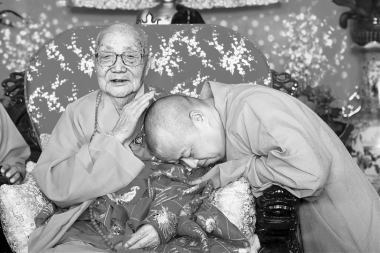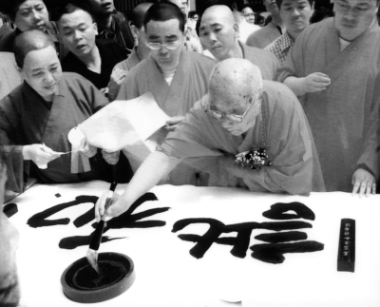   Wang Yuanyuan RENOWNED Chinese Buddhist master Benhuan passed away in Shenzhen’s Hongfa Temple, in Luohu District, Monday at the age of 106. Benhuan, born in Hubei Province in 1907, is regarded as an eminent Buddhist in China and overseas. He was also a generous philanthropist. During his 80 years of practicing Buddhism, he donated more than 10 million yuan (US$1.6 million) to build roads, schools and hospitals across the country. In recent years, the eminent Buddhist fought hard against diseases but never forgot his duties as a Buddhist, or to the people for whom he cared and loved all his life. “He suffered from serious diseases and was in pain most of the time, but every day when he opened his eyes, his first thoughts were about construction of the temples and people’s lives,” said Yinshun, who succeeded Benhuan as abbot of Hongfa Temple in 2008. Benhuan’s age of 106 is according to Chinese tradition, which adds a year to western calculations. Always caring Benhuan began suffering from serious diseases about eight years ago because of his very advanced age. Although he had a brief recovery at one point, his condition worsened last year and he had to be treated in Guangzhou for a significant period of time. Intestinal problems limited his diet to only porridge or nutritional fluid injections. “But he never complained and was always optimistic about life. Sometimes he even comforted us, saying we should not be worried,” said a close friend of Benhuan who refused to be identified. Even in his last few days, Benhuan lived a very simple and economical life, asking people not to forget about doing good deeds for others. “When he saw a lot of volunteers taking care of him day and night, he was upset and asked them to go back home and take a good rest. He said they were too young and should get good sleep for a healthy life,” Yinshun said. He also cared about the temples under construction. “Two days before he died, he still asked about the construction quality. He said there were a lot of Buddhist treasures that would be put into the new temples and towers, so I (as the construction supervisor of one of the temples) should go back to the construction site instead of taking care of him,” said a follower surnamed Wang. Public mourns After learning of Benhuan’s death, many followers were struck by sorrow. On Tuesday, the first day after his death, more than 100,000 followers from Guangdong, Macao and Hong Kong paid their respects at the temple. Some longtime followers knelt in front of his remains for hours to express their sadness. “We were shocked and sad. We came here immediately from Nanshan District right after learning of his death on the Internet. Our family is Buddhist and we heard about his bad condition several days ago and decided to pay a visit during the [Qingming, or Tomb-sweeping] festival. But we did not expect that he would leave so suddenly,” said a follower surnamed Gu. Gu and his family met Benhuan several times. “We were impressed that he still insisted on meeting followers every day, despite his poor health. From him, we have learned a lot about life and love. He always taught us to love and care for others. Even though we had to queue for hours to meet him for the last time, it was still worth it,” Gu said. The country’s religious affairs authority, Buddhism association and many religious organizations in other provinces and cities sent their condolences Monday. A letter sent by the State Administration for Religious Affairs spoke highly of Benhuan’s contributions to promoting Buddhism and charitable activities in the country. “As a Buddhism master, he worked hard to build temples, participate in charitable activities, pass on his spirits and knowledge, and influence the public,” the letter said. “He also created a modern temple management system, making Hongfa Temple an important platform for Chinese religious exchange and communication.” The country’s high-level Party and government officials and Buddhism masters such as Chuanyin, president of the Buddhist Association of China; Zhu Weiqun, executive vice director of the United Front Work Department of the CPC Central Committee; Wang Zuo’an, director of the State Administration for Religious Affairs; Zhu Mingguo, vice Party chief of Guangdong Province; Lei Yulan, vice governer of Guangdong Province; and Wang Suiming, vice Party chief of Shenzhen, all sent letters to Benhuan and became members of his funeral committee. An incredible life of Buddhism Benhuan became a monk in 1930 and was the 44th descendant of the Linji sectarian in Chinese Buddhism. He promoted Buddhism in more than 20 countries and regions and attracted more than 2 million followers around the world. His legendary spiritual accomplishments include meditating for 91 consecutive days without sleep in his youth; locking himself in a temple for seven years; spending an entire year traveling on a pilgrimage from Baoding in Hebei Province to Wutai Mountain in Shanxi Province, kowtowing to bodhisattva every three steps; and copying 19 Buddhist scriptures containing more than 200,000 characters with blood from his fingers and tongue. He was the abbot at a number of reputed temples in Guangdong Province, including Nanhua Temple, the most important temple in the South sectarian of Chinese Buddhism; Biezhuan Temple in Shaoguan City; and Guangxiao Temple in Guangzhou. He founded Hongfa Temple in 1985 and became the first abbot of the temple in 1992. He was elected honorary president of the Buddhist Association of China in 2010. | 
